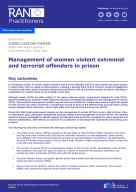Details
- Publication date
- 22 February 2024
- Author
- Directorate-General for Migration and Home Affairs
- Country
- Italy
- RAN Publications Topic
- Prison and probation
Description
An increasing number of women violent extremist and terrorist offenders (VETOs) have entered the prison system in recent years. This is a result of various factors, including a growing trend when it comes to women’s engagement in terrorist and other violent extremist background activities as well as a growing number of women returning or repatriated from conflict zones to the European Union (EU).
Although women VETOs are often subject to the same measures and/or programmes designed for men VETOs, special considerations and tailor-made measures should be developed and adopted for the management of women VETOs. These should include gender-specific requirements and consider the multiple roles women might have played on their journey into violent extremism. Consideration should be given to the different push and pull factors among women towards violent extremism, which might differ from the ones found among men VETOs.
During this RAN Small-scale experts meeting on the management of women VETOs in prison, held in Rome, Italy, on 9 November 2023, participants shared their expertise related to the management of women VETOs. This meeting aimed to improve knowledge on specific aspects and elements that should be considered by prison personnel and relevant stakeholders, while offering an occasion for practitioners to exchange their experiences and existing good practices.
The following key outcomes summarise the meeting’s overarching insights:
- The profile of the women VETOs in prisons in Europe today is that of foreign fighter returnees from Syria and Iraq who were involved with ISIS and who returned voluntarily or were repatriated. Some women were affiliated with other Islamist extremist groups, for example Salafist movements in the Netherlands. In some EU Member State prisons, there is also a small number of right-wing extremist (RWE) women and a few left-wing extremists (LWE).
- The number of women VETOs is comparatively smaller to that of men VETOs. Nevertheless, their number has increased in the past few years so there is a need to re-examine the necessary prevention and countering violent extremism (P/CVE) work with this target group.
- Some EU Member States use specific gender-based interventions that take into account the different needs and risks of women VETOs.
- Many of the women VETOs in prisons are victims of abuse (sexual or other) themselves. This trauma affects their actions and requires mental health interventions.
- In many of the cases, a woman’s relationship with a man was associated with her radicalisation process and activity. While some women were influenced by their partners’ radicalisation processes and involvement in violence, there were also instances of women who involved their partners in extremist activity.

